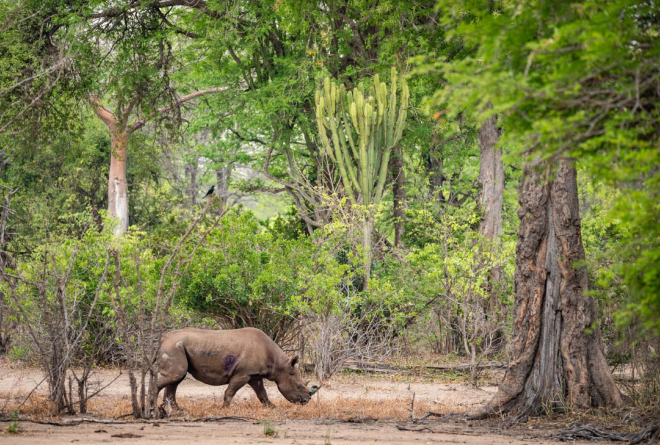Building Climate Resilience in Communities Surrounding Protected Areas
Objectives
The project aims to develop climate-resilient livelihoods for communities around three of Malawi’s iconic protected areas: Majete Wildlife Reserve, Nkhotakota Wildlife Reserve and Liwonde National Park. It is doing this by:
• Building the capacity of the parks’ community extension teams with training, tools and partnerships
• Building the capacity of local community governance structures
• Developing climate resilience through enterprise development, conservation agriculture and access to water
• Improving education levels and public awareness on park conservation and climate resilience.

Activities
• Building the capacity of the parks’ community extension teams: The community extension team has grown in size, and managers have held an exchange visit with Akaggerra National Park in Rwanda – to learn from their success. The park teams are using broadcast media to raise community awareness of management issues, especially during the COVID-19 pandemic.
• Building the capacity of local communities: Village Natural Resource Committees have received training to strengthen their capacity, including in institutional governance. Different activities such as tree planting competitions have been held to raise community awareness of conservation.
• Developing climate resilience: community members have been taking part in alternative livelihood activities including beekeeping, moringa farming, arts and crafts, jewellery making and campsite management in Majete; beekeeping, goat farming, community guide work and irrigated farming in Liwonde; and beekeeping, moringa, mushroom and goat farming in Nkhotakota. Hundreds more have benefitted from a natural resource use programme in Majete and Nkhotakota. The natural resource use programme allows communities to enter the park and periodically harvest some natural resources such as bamboo, palm fronds, fruit-masuku, mushroom, wild vegetables and herbs. Communities are also allowed to harvest grass thatch bundles, bamboo, reed and medicinal herbs.
• Improving education levels: the project has built schools on the border of the parks: two school blocks in Majete, two in Liwonde and four teacher houses and a school block in Nkhotakota. The project has also been offering educational scholarships to pupils to help with their expenses.
Results
• A Community Toll-free Hotline has been established where communities can call directly to report any safeguarding or animal breakout incidents.
• 7,453 community members have benefitted from alternative livelihood projects around the parks so far (2,506 from Majete, 2,184 from Liwonde and 2,763 from Nkhotakota).
• Hundreds more community members have benefitted from participating in natural resource use programmes.
• The parks have awarded 421 scholarships to pupils (107 in Majete, 99 in Liwonde and 215 in Nkhotakota). Unfortunately, though, schools have been closed for much of 2020 due to COVID-19. • Graduating scholars are enrolled into an alumni network where they share successes and motivate each other.
For more information, visit the African Parks website.
Lessons learned
Farmers participating in the project do not currently have a market for moringa. The coronavirus situation has compounded the challenges of accessing markets to sell their produce. Farmers would benefit from even better linkages with external markets so that they are able to sell beyond the local markets and tourist lodges around the parks. Bee keepers make relatively good money – but they tend to spend the money quickly (including on alcohol) and have poor financial planning. At the baseline assessment, their health and nutrition was lacking, so they would benefit from developing more sustained good habits and investing in their and their families’ longer-term health and wellbeing.
Contact
John Njunga: njungaj@africanparks.org
All images: Malawi protected areas, courtesy African Parks.
